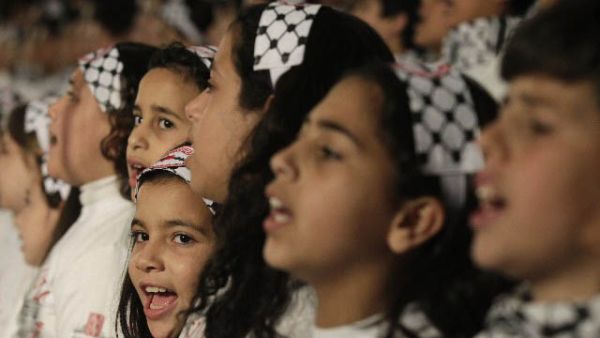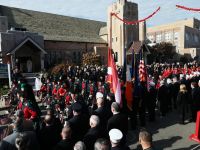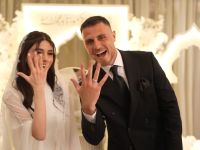Thirteen-year-old Ali Musa, a Palestinian refugee, declares that he plans to become a musician in the future, thanks to a new music program seeking to unite Palestinian voices.
“I will be playing the oud in the future to earn a living,” he said.
Musa and another 700 Palestinian children from Lebanon, Jordan, Syria, the West Bank and Gaza Strip had the opportunity to take part in an Al-Sununu Choir, a three-year music program, organized and funded by the Association Rostropovich-Vishnevskaya.
Established in Paris by Russian musician Elena Rostropovich in 2008, the non-governmental organization seeks to help marginalized children all over the world through music education and other social programs.
The program wrapped up Tuesday as 700 children across the region performed simultaneously in Beirut, Amman, Damascus, Gaza and Bethlehem in a single concert via satellite, with the aim of uniting Palestinian voices.
“I’m happy because it is my second year at Al-Sununu Choir. ... I performed today with my friends in Syria, Gaza and the West Bank. ... I want to be a musician in the future,” said another Palestinian child, who like Musa, took part in the Beirut concert that was held at Babel Theater in Hamra.
Some 70 Palestinian children took part in the Beirut concert, which was supervised by singer Umaima al-Khalil.
Souad Qabbani, whose two children Ula and Alaa took part in the three-year program, said she didn’t mind if her children grew up to work in the music industry, but she had one condition: that they earn a degree in the field.
“I used to encourage them to continue the music program because it is something that they like. I used to memorize songs and sing with them as well,” Qabbani said while waiting to enter the theater and watch her two children perform.
“I don’t mind that they continue with music on the condition that this does not distract them from their studies,” she said.
Among the project’s goals is to preserve the traditional music of Palestine, and unite Palestinian children “through their traditional music to become one voice, thus creating solidarity.”
The project also seeks to create a Palestinian music history book for kids.
During the concert, the children sang traditional Lebanese, Palestinian and Arab songs like “Tik Tik ya umm Sleiman” by the Rahbani brothers, “Biladu al urb Awtani,” by the Fleifel brothers and “Asfour tal mnil-Shubbak,” by Marcel Khalifeh.
At the end of the one-hour concert, all of the 700 kids sang the traditional Palestinian song “Wein a’Ramallah.”
Addressing the participants at the concert, Rostropovich who was speaking via satellite from the Gaza concert, said the event was a “historic moment,” with Palestinian children scattered throughout the region singing together.
“Today is a day of celebration and unity. It is very important that traditional music be passed from generation to generation because this is an integral part of the heritage and the place of a nation,” she said.
“Since we started this project, we have discovered very talented children with beautiful voices which inspired me to create more and more choirs. I would like to encourage all the Al-Sununu children to aim for senior studies in music, to always go forward and never give up even if there are obstacles in the way.”
Rostropovich said that coming from a family of musicians and being a musician herself, she believed that music should be an integral part of education because it is the only tool that develops both analytic capacities and emotional self-expression.
Do you think carrying on the traditional music is important? Please share with us your thoughts.








